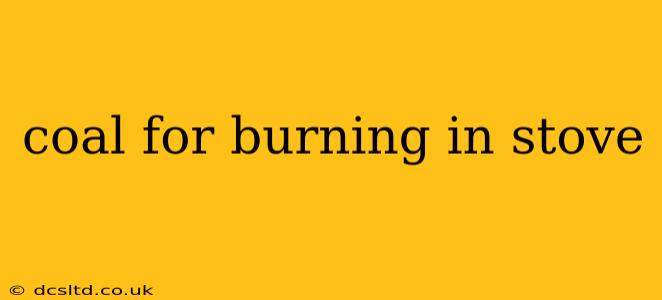Burning coal in a stove might seem like a relic of the past, but for some, it remains a practical and even romantic way to heat their homes. However, before you stock up on coal for your stove, it's crucial to understand the nuances of this fuel source, from choosing the right type to ensuring safe and efficient combustion. This guide will cover everything you need to know about using coal in your stove.
What Types of Coal Are Suitable for Stoves?
Not all coal is created equal. The type of coal best suited for your stove depends largely on the stove's design and your specific needs. Generally, anthracite coal is preferred for home stoves due to its low sulfur content, cleaner burn, and longer burn time. Bituminous coal, while cheaper, produces more smoke and ash, potentially requiring more frequent cleaning and potentially leading to higher maintenance costs.
What are the differences between anthracite and bituminous coal?
Anthracite coal, also known as hard coal, has a high carbon content and burns hotter and cleaner than bituminous coal. It produces less smoke and ash, resulting in less frequent cleaning of your stove. Bituminous coal, or soft coal, has a lower carbon content and burns with a hotter, more intense flame than anthracite. However, it produces significantly more smoke and ash, demanding more frequent cleaning and potentially impacting air quality. The choice often comes down to a balance between cost and convenience.
Is it Safe to Burn Coal in My Stove?
Burning coal safely requires careful attention to several factors. Firstly, ensure your stove is properly sized and designed for coal combustion. Improperly sized stoves can lead to inefficient burning, excessive smoke production, and potential fire hazards. Always follow the manufacturer's instructions regarding fuel type and usage.
What safety precautions should I take when burning coal?
- Ventilation: Adequate ventilation is crucial to prevent the buildup of carbon monoxide, a deadly gas. Ensure your home has proper ventilation systems and that they are functioning correctly. Never burn coal in an unventilated space.
- Chimney Cleaning: Regular chimney cleaning is essential to remove creosote buildup, a flammable byproduct of coal combustion. A clogged chimney increases the risk of chimney fires.
- Proper Storage: Store coal in a dry, well-ventilated area away from flammable materials. Proper storage prevents moisture absorption, which can reduce coal's burning efficiency.
- Supervision: Never leave a coal-burning stove unattended, especially when children or pets are present.
How Much Coal Do I Need to Heat My Home?
The amount of coal needed to heat your home depends on several factors, including the size of your home, the stove's efficiency, the outside temperature, and the type of coal used. It's best to consult with a heating professional or refer to your stove's manual for guidance on coal consumption rates. Overestimating your coal needs is better than underestimating, as running out of coal in the middle of a cold spell can be inconvenient and potentially dangerous.
How long does a typical load of coal last?
The burn time for a single load of coal can vary greatly depending on the size of the load, the type of coal, and the settings on your stove. However, a typical load of anthracite coal might last for several hours, while bituminous coal may burn through more quickly. Observing your stove's performance and making adjustments as needed is key to optimizing coal consumption and maintaining a consistent indoor temperature.
Where Can I Buy Coal for My Stove?
Coal is typically sold by coal suppliers, lumber yards, or online retailers specializing in heating fuels. When purchasing coal, be sure to inquire about the type of coal, its sulfur content, and its origin. Choosing a reputable supplier ensures you receive high-quality coal suitable for your stove, reducing the risk of inefficient burning and potential problems.
What should I look for when buying coal?
When purchasing coal, pay attention to the size of the coal pieces. Larger pieces generally burn longer and more efficiently than smaller pieces or coal dust. Look for coal with low sulfur content, as higher sulfur content can lead to more pollution and damage to your stove. A reputable supplier will be able to provide information about the coal's origin and quality.
By understanding the nuances of coal as a fuel source and following proper safety precautions, you can enjoy the warmth and ambiance of a coal-burning stove while minimizing potential risks. Remember, always prioritize safety and consult with professionals when needed.
